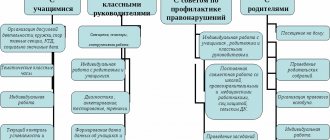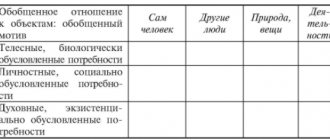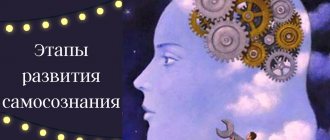Updated July 22, 2021 749 Author: Dmitry Petrov
Hello, dear readers of the KtoNaNovenkogo.ru blog.
The material and spiritual in a person’s life are two components of his existence.
Each person is individual, therefore people have different priorities: for some the main value is material wealth, for others it is the work of the soul.
Today we’ll talk about what material and moral values are. Let us dwell in a little more detail on the interpretation of values related to the spiritual sphere.
Values are...
The word “value” is the same root as the word “price”. Therefore, values are what have their price . In this case, the price is not necessarily expressed in monetary or other material equivalent. Price and value are not synonymous.
Value is, first of all, the significance of an object for a person. Therefore, value is a purely subjective concept, depending on the worldview (how is that?) of a particular individual.
I’ll explain with an example: let’s say the price of a tractor = 3 million rubles. But teacher Ivanov does not need a tractor, so the tractor has no value for him.
This same Ivanov adores his wife and little daughter. His love has no price, but at the same time is the main value in his life.
Values are usually divided into material (having a price expressed in material equivalent) and moral (not having a material assessment).
Moral values include life, family, moral, and spiritual values. Next, we will consider the interpretation of some values.
Who is a rich man?
There is an opinion that rich people are mostly immoral. Mikhail Zadornov spoke about this very interestingly: “A rich man comes from the word God. That is, a rich person is one in whom there is a lot of God. And the one who has a lot of money is a collector.” Very accurately noted. And if a person has everything in order with energy, all centers are developed harmoniously, then his development occurs at all levels, but if there is a bias in one direction, this indicates the presence of problems.
As mentioned above, you can only renounce what a person has. It is easy, being a beggar, to renounce wealth. Here we can give the example of Prince Siddhartha, who lived 2500 years ago, who left everything: his father’s palace, wealth, luxury, the right to inherit the throne and become a great ruler and conqueror.
He exchanged all this for a monastic cloak and a begging bowl. And this is the greatest example of true renunciation, when for the benefit of others a person sacrificed everything. And after going through many trials, Prince Siddhartha became Buddha.
There was another interesting example in the story of Buddha. One day a woman came to his sermon with nothing but a cape in which she walked. And wanting to do at least something for this holy man, she donated all her property to him - her cape. And then the Buddha turned to the kings present at the meeting, who donated a lot of jewelry to the Buddha, he said: “This woman’s donation exceeds all your donations. Because she gave everything she had."
That is, for the kings their donations were not so significant; for them it was a drop in the ocean. And the woman gave her last. And here, by the way, the law of karma instantly worked: the kings present at the meeting, hearing this, donated a lot of clothes, jewelry, jewelry, and so on to this woman.
Thus, it is not so important how much money a person has, what is more important is that he is able to give and share. And this is a sign of a truly rich person. And here again we are talking about harmonious development. On the one hand, if a person has a lot of money, but is not able to sacrifice, such a person can be called a beggar, because he is completely useless to others. On the other hand, if a person has nothing at all, then such a person is a beggar, because he also cannot give anything to others.
Also speaking about poverty, one cannot fail to mention the law of karma. If a person has no material wealth at all, this indicates that for a long time he behaved like an egoist, did not share anything with anyone, and now he is reaping the fruits of his stinginess. Again, we can give the example of Buddha: he was born the son of a great king and lived in luxury.
And this is a sign of a holy personality - harmony on all levels, both material and spiritual. And if a person experiences problems on a material level, it means that he simply did not create reasons in the past to be financially secure. And this is a reason to start cultivating generosity within yourself.
Material values
Material assets (MT) are objects that have a physical shell and can be bought, sold or exchanged.
Examples of MC: real estate, household items, vehicles, goods, equipment, etc.
Material assets can be the property (how is that?) of an individual, family, organization (individual entrepreneur or legal entity), or state. MCs owned by a legal entity, individual entrepreneur or state are under control and subject to accounting.
Some types of MC are taxed (including real estate of individuals).
In accounting (what is it?), all material assets used in the economic activities of an enterprise are called inventory items (TMAs) .
The list of goods and materials of enterprises includes:
- raw materials, materials, components for the manufacture of products;
- work in progress (“unfinished” products);
- goods in warehouse (goods produced but not sold to the buyer);
- consumables used in the production process;
- container;
- means of production (equipment and tools).
All inventory items are assets (how is that?) of the company. The movement of inventory items from the moment they are entered into the balance sheet of the enterprise is carefully recorded.
The stages of inventory movement include the following main points:
- receipt (arrival) – this can be delivery, transfer, exchange;
- storage;
- disposal.
To eliminate discrepancies between accounting information and the real state of affairs, the enterprise carries out regular inventories (how is that?). The movement of inventory items is recorded by accounting entries, on the basis of which a balance sheet is then formed.
What is happiness?
In this regard, happiness is never an absolute state. As you know, what matters to a person is the path he takes to achieve his dream, and not the fact itself. The more thorny and tortuous the road leading to happiness, the deeper the awareness of the meaning of existence. People of creative professions, who are not placed in strict conditions, always experience happiness. They enjoy the process, sometimes despite the lack of material wealth. These people are confident that they have found the meaning of existence in their works (paintings, sculptures, songs). These works reflect all the best that is in our life, and this best will live on for centuries. So we smoothly approached the second aspect of human values, to what awaits a person outside of life.
Human values
The evolution of humanity implies not only a change in man as a biological species, but also the evolution of the worldview of “homo sapiens”. According to Darwin's theory, humans evolved from apes. For lack of a better guess, we will agree with this theory.
It is obvious that the main values of the ape-man were exclusively material: to get food, to protect themselves from predatory animals. Over time, man learned to hunt, make fire, and grow the necessary plants.
Survival priorities ceased to be fundamental, and a person’s worldview began to change.
New values began - caring for loved ones, educating the younger generation, honoring wisdom, admiring the gods.
How do worldviews and life values relate? Worldview is a system of values of a particular individual, formed according to the principle of “what is good and what is bad.” Worldview is formed from birth, from the first “dos” and “don’ts” said by parents.
Throughout his life, a person comes under the influence of different people, different social groups. Under the pressure of external influences, the system of life values can shift in one direction or another, as a result of which the worldview also changes.
The determining role in shaping the worldview of a particular person is played by the foundations of the society in which this person is forced to live (we do not choose the place and time of birth).
Thus, the value system of an aborigine tribe of cannibals from the wilds of the Amazon is fundamentally different from the traditional values of residents of civilized countries.
This proves that it is the established value system of a particular society that shapes the worldview of each of its members.
But the worldview is not static. Let's remember Hitler - in just a few years he managed to “correct” the worldview of hundreds of thousands of people, convincing them that only the Aryan nation is worthy of living and ruling the rest of the world.
But the most notorious Nazis (who are they?), who destroyed millions of civilians, were once cute, plump babies, they were raised by respectable parents and the system of instilled values was also quite respectable.
The influence of external factors and individuals on changing the foundations of society and the associated value system cannot be underestimated. This is exactly what history warns us about.
| Contents of the site =>> Russian Humanistic Society =>> “Common Sense” =>> 2008, No. 4 (49) Site “Reason or Faith?”, 03/06/2009, |
COMMON SENSE Autumn 2008 No. 4 (49)
WHAT IS HUMANISM?
| Human values Vladimir Efimov Valery Talanov |
About the concept of “universal human values”
The problem of universal human values is one of the most complex, affecting the interests of different social groups. The stunning variety of points of view on this issue fits between two polarities: (1) there are no universal human values; (2) there are universal human values.
The arguments of the first can be divided into three types:
a) there were no universal human values, there are no and there cannot be; this follows from the fact that, firstly, all people and human communities had and have special, different and even incompatible interests, goals, beliefs, etc.; secondly, like any ideological problem, the problem of determining value cannot have an unambiguous solution at all; it is difficult to formulate; thirdly, the solution to this problem is largely determined by epochal and specific historical conditions, which are very different; fourthly, values were and are only local in time and space;
b) there were and are no universal human values, but the concept itself is used or can be used for good or selfish purposes to manipulate public opinion;
c) there were and are no universal human values, but since different communities do not exist in isolation from each other, then for the peaceful coexistence of various social forces, cultures, civilizations, etc., it is necessary to develop an actually artificial set of certain “universal human values.” In other words, although such values actually did not exist and do not exist, they can and should be developed and imposed on all people, communities, and civilizations.
The arguments of the second point of view can be summarized as follows:
a) universal human values are only a material phenomenon, i.e. physical or biological: (wealth, satisfaction of physiological needs, etc.);
b) universal human values are a purely spiritual phenomenon (abstract dreams of Truth, Goodness, Justice...);
c) universal human values are a combination of both material and spiritual values.
At the same time, some consider “values” to be stable, unchanging, while others consider them to change depending on changes in economic, political, military and other conditions, on the policies of the ruling elite or party, on changes in the socio-political system, etc. For example, in Russia the dominance of private property was replaced by the dominance of public, and then private. Values have changed accordingly.
Each person, any society certainly enters into different relationships with himself, with his parts, with the world around him. The whole variety of such relationships can be reduced to two types: material and spiritual or material-spiritual and spiritual-material. The first includes all types of practical activities: the production of material goods, economic relations, transformations in the material sphere of social life, in everyday life, experiments, experiments, etc. The spiritual-material includes, first and foremost, cognitive, evaluative, normative relationship. Cognitive relationships certainly contain the search for a solution and the process of solving such universal questions: “what is it?”, “what is it like?”, “how much of it?”, “where (where, from)?”, “when (how long, until or after)?”, “how (how)?”, “why?”, “why?” and etc.
Evaluative relations are also associated with the search for universal questions, but of a different kind (questions concerning the meaning of the cognizable or cognizable, its significance, attitude towards people: “truth or error (false)?”, “interesting or uninteresting?”, “useful or harmful? ", "necessary or unnecessary?", "good or bad?", etc.
Of course, it is only possible to evaluate what is at least to some extent known. The assessment and the degree of its adequacy are directly dependent on the level, depth, and comprehensiveness of knowledge of the person being assessed. Further, it has the opposite effect on the further course of the cognition process. If values are impossible without evaluation, this does not mean that they depend entirely on it. All universal human values are connected with the objective reality of nature and society, that is, they really exist. Consciousness can contain only desires, ideas, understanding of values that differ among different people, communities, etc. But there must be and in fact there is something common in values even for the most different people, i.e. they have always been and exist human values.
Based on evaluative attitudes and the experience of their application to nature, society and man, norms and rules of behavior are formed, which represent the denominator, the general result of social experience, which guides people in further cognitive, evaluative and practical activities. The elements of such normative relations are usually referred to by the terms: “principle”, “rule”, “requirement”, “norm”, “law”, “installation”, “commandment”, “covenant”, “prohibition”, “taboo”, “mandate” ", "definition", "creed", "creed", "canon", etc.
What is valuable, which is recognized as such by people in the process of their activities, is very heterogeneous. Therefore, it is impossible not to distinguish:
1) values as such, as initial, fundamental, absolute (in the sense of indisputable), eternal (in the sense of always existing), etc.
2) values that are private.
Since axiological (evaluative) activity directly depends on cognitive activity, values cannot be that which is incomprehensible to our thinking, which is unreal, impossible, unfeasible, unattainable, unrealizable, imaginary, fantastic, utopian, chimerical, etc. “Value is a term used in philosophical and sociological literature to indicate the human, social and cultural significance of certain phenomena of reality" [3]. This means that value is something real that is (exists) and at the same time has greater or lesser significance and importance for people.
When using the term “universal” one should keep in mind at least three interrelated aspects:
1) universal (in the sense: common to everyone) as something that concerns every practically healthy and sane person (from primitive man to modern);
2) universal as something that represents an absolute, enduring and highly significant need for humanity as a whole (for example, environmental values);
3) universal as something that is or should be the focus of attention of every state (for example, national and international security).
Taking these aspects into account, we will define the concept of “universal human values”. Universal human values are those things that are truly important for people, which are certainly necessary, desirable, which have lasting, essential significance for almost every normal person, regardless of his gender, race, citizenship, social status, etc. Universal human values are highly significant for humanity as the unity of all people, as well as for any state, insofar as it meets or should meet the needs, interests, requirements of society and the citizen.
In accordance with the three areas of existence of universal human values, three types of systems of these values should be distinguished: general personal values, values common to all humanity and values in the sphere of activity of states or a union of states. The starting point, as we believe, is a system of personal or general personal values.
System of universal personal values
Among this kind of values, the initial, central and most important is the life of the individual, which acts as the ontological (existential) basis of all other values of the first type 1.
If for any inorganic formation it is indifferent whether it exists or not, 2 then for a living formation the main thing is to exist, to be, that is, to live and prolong its life. This means that for all living beings, being is life, and the essence of life is (no matter what sometimes stupid meanings we burden and replace it with) so that it (life) exists and continues 3. But if “value” is inherent in life by itself its nature, then all the more so it should be inherent to the highest degree (and, in fact, is inherent) to every person as the top of the “biological pyramid” that has reached the level of sociality.
| ...The idea of the eternity of human life in a materialistic, atheistic interpretation began to appear in the form of “everything remains to people,” that is, every person after death does not disappear without a trace, but remains in the world in his descendants, in the good and bad fruits of his activities, in memory humanity, and its flesh was and remains a part of nature, but in new physical and chemical forms. |
Hence, the most important universal (in the sense: for all people, for each person as a biosocial being) central, initial, value, fundamental basis of all other universal values is life.
Apparently, precisely because life has always been considered by people to be the highest, original value, already in the early stages of the history of society, ideas, ideas arose, and then various more or less developed mythological teachings about the immortality of the soul, i.e. that life every person in its different forms is eternal 4. People could not and many still cannot imagine that death is the absolute end of existence. They wanted to be eternal and came up with options for their eternity. Subsequently, these ideas and ideas became indispensable elements of any religion.
In science, this idea of the infinity of life was formulated by V.I. Vernadsky in the principle of beginninglessness and eternity of life. In modern natural science this idea is expressed, in various variations, in the form of exobiology, and in ancient times the idea of panspermia was formulated. The same idea of the eternity of human life in a materialistic, atheistic interpretation began to appear in the form of “everything remains to people,” that is, every person after death does not disappear without a trace, but remains in the world in his descendants, in the good and bad fruits of his activities, in memory of mankind, and its flesh, as it was a part of nature, remains so, but in new physical and chemical forms.
Life is one of the key words in our spoken language. When meeting, people address each other with the words: “How is life?”, “How are you?”, “Well, how is life?” etc. And wishes usually contain the words: “Be healthy” (or simply “Be”), “Many years!”, “Many (“long”) years of life!”
Any person lives in certain natural and social conditions that may turn out to be or seem completely hostile and intolerant. A person can take his own life, leave this world, hoping to move to another. In certain extreme situations, a person, under the influence of certain ideals, principles, beliefs, convictions, can sacrifice his life, again often hoping that he will be rewarded for this in another world or in this one in the form of a good memory of him. But both the first and second concern a very small percentage of the population. Under normal conditions, even believers, practically, in everyday life, consider this earthly life to be the main value, and value it. Various aspects of life as the highest value are considered in [4 – 8].
| People have always, one way or another, felt the need to seek, acquire, and have the truth. In the pre-scientific era, people's understanding of truth was very ambiguous... But truth was always highly valued. Its bearers enjoyed special respect... Far-sighted rulers cared and are caring about the development of science and education. This means that truth stands on a par with other initial main human values. This is the highest intellectual value, the value of man as Homo sapiens. |
The normal state and course of life of any living organism presupposes its health. Likewise, a person wants not only to live, but to live without illness, without pain, physical and mental suffering, bruises, injuries, mutilations, unpleasant health, that is, he wants to be healthy. Hence, another value directly related to life is health as a life-preserving, primarily medical value.
What do people want? Of course, health is the basis and condition of all good. “We wish you good health, and everything else will follow!” , “Great bulls!” When meeting they say: “Good morning !”, “Hello!”, and when parting for a short period of time: “Be healthy!” And even when sneezing they say: “Be healthy!”, i.e. “Don’t get sick!” And when they say “Goodbye!” (by the way, literally the same is said not only by the Slavs, but also by the Italians, Romanians, Germans, etc.), they mean that we will be alive and well and therefore we will see each other, we will meet, we will meet: “do widzenia!” (Polish); “Do vision!” (Slovakian); "auf Wiedersehen!" (German); “till we meet again!” (English); "au revoir!" (French); "arrivederci!" (it.); “Hasta la vista!” (Spanish). There are many popular proverbs and sayings that emphasize the importance of health. “Health is the head of everything”, “A healthy mind in a healthy body”, “Health is wealth”, etc.
But in order to be alive and healthy, you need to have favorable conditions for life and health, which means well-being, prosperity, well-being. The words “good” and “good” can act as synonyms. As F. Engels noted: “...people must first of all eat, drink, have a home and dress before being able to engage in politics, science, art, religion, etc...” [9]. This means that the presence, first of all, of material support for life and health underlies any type of activity of every person in any society. Therefore, material good is the highest utilitarian value for man as a physical being.
Goodness is associated with other values, including happiness. V.I. Dal noted that good is everything that is good, useful, and serves our happiness. Well-being is a life in abundance of goods, a calm and happy state, existence.
| Happiness is the state of a person’s greatest internal satisfaction in something important to him. There are no standards for happiness; it is always unique. And this is also our happiness. |
Good is everything that is necessary and useful for life and health, that is, objects that can satisfy human needs, which either exist in nature in a ready-made form and need to be found and collected, or they do not exist in nature and need to be created. In any case, human action is necessary. Therefore, every person is an active (active) biosocial being.
Human activity is an extremely broad concept, it includes all types of activity and is marked by a variety of human states from delight and inspiration to fatigue, boredom, etc. At the same time, there is such an extremely important type of activity as creativity, it is inherent precisely and only to man. At first, our very distant ancestors acted not only instinctively, but also imitated natural phenomena and processes, learning from nature (which, in fact, continues to this day in significant acts of activity). Over time, on this basis, they began to invent and create, to do things that nature could not produce. This process is creativity.
Both primitive man, a child, and a modern adult experience special, joyful emotions and feelings when they manage to discover, invent, invent, construct, create something new that does not exist in nature, or improve what has already been created by people. It was creativity that to the greatest extent allowed and allows a person to feel and realize himself as a creator, the creator of the unprecedented. This elevates a person, makes his “I” not only especially significant, but also a unique phenomenon of the natural world. Creativity is one of the most important human values, namely, an activity value. The results of creativity capture the unity of the external world and the emotional and rational activity of man. It is the latter that makes us turn to such an important property of a person as reason.
To live, be healthy and provided with the necessary benefits, any person needs to be sufficiently aware of the world around him and himself, to navigate the world not only at the level of instincts and innate reflexes, but also on the basis of knowledge. Primitive people carried out knowledge mainly by the “trial and error” method, however, among the diverse forms of knowledge there is a special, most reliable and useful knowledge. This knowledge is scientific.
People have always, one way or another, felt the need to seek, acquire, and have the truth. In the pre-scientific era, people’s understanding of truth was very multifaceted: it included experimental and sacred knowledge, skills (knowledge of how to do something), legends, beliefs, omens, hopes, beliefs, etc. But truth was always highly valued. Its bearers were especially respected: old people, shamans, sorcerers, magicians, sorcerers, soothsayers, priests, philosophers, scientists. Far-sighted rulers cared and are caring about the development of science and education... This means that truth stands on a par with other initial main human values. This is the highest intellectual value, the value of man as Homo sapiens.
If creativity is necessary to create goods, and the latter - for health and life, then truth as a process and result of creativity, cognitive and research activity is necessary for creativity in any field. Creativity is an activity not only of a utilitarian and cognitive-research nature, but also of a moral and, especially, artistic and aesthetic nature. The latter is associated with all the emotional and intellectual gifts of a person. Already in primitive society, people painted, sculpted, sculpted, carved, decorated their homes, household items, clothing, weapons, tools, objects of worship, and themselves; they sang, played music, danced, and performed scenes of various types. This means that beauty (beauty) is the highest universal aesthetic value.
In unity with the considered values, the feeling and idea of justice is formed and acts. Justice is the awareness of the compliance of interpersonal relations with moral and legal institutions, it is an expression of order in society, as well as ensuring the interests of people and respect for their dignity. Meeting what corresponds to the idea of justice generates satisfaction in people. On the contrary, injustice causes negative reactions (resentment, indignation, anger, hatred, envy, vindictiveness, etc.) and pushes us to fight for the restoration and triumph of justice. This suggests that justice is the most important universal moral and legal value.
A kind of pinnacle of the complex of “universal” values, as if built on top of others discussed above, is happiness , in which the harmony of truth, justice and beauty creates a special state of life. Every person desires happiness (at least for himself), strives for it. Happiness is the state of a person’s greatest internal satisfaction in something important to him. There are no standards for happiness; it is always unique. And this is also our happiness.
Some people are happy because they are alive (for example, they remained “miraculously” alive after a war, a disaster, a criminal act against them, etc.), others are happy because they have a wonderful family, a beloved “half,” wonderful children. On the contrary, there are those who consider themselves unhappy, although they are surrounded by everything necessary, useful, and interesting. But it often happens that after some time a person realizes that he was happy, but was not aware of this (after all, as they say, everything is known by comparison). Therefore, there is such a definition: “happiness is something that, having had, we do not value, but having lost, we cry.”
Each of the considered values has material and spiritual, objective and subjective components that are in unity and interaction. But their “specific weight” and role in different values are not the same. The direct connection between these values in the series from “life” to “happiness” is mainly in the nature of conditioning the subsequent preceding ones (in the order in which we consider them), and the feedback is in the nature of a reverse active influence. But in general, in these relationships and interactions, a large role belongs to the material, objective component.
Two “ranks” of opposites are lined up: “life – health – good (good) – creativity – truth – beautiful – justice – happiness” and “death – illness – idleness – evil – lies – ugly – injustice – misfortune.” In the first chain of concepts, values are interconnected by a certain correspondence, kinship, they are in unity with each other, and in the second, all anti-values are in their unity, correspondence, kinship.
“Public” values are the main criteria for everything related to the assessment of both facts, conditions, and actions. Therefore, we say: “this is dangerous (or not dangerous) for life”, “this is good (harmful) for health”, “this serves good (evil)”, “this is true (false)”, etc.
Humanity values
In the “Modern Explanatory Dictionary of the Russian Language,” humanity is defined as follows: “people, the human race, human society.” This means, combining this, we can say that humanity is a multiple-integral biosocial formation. Therefore, the values of humanity and universal human values, although interconnected, can be neither identical nor opposite to each other.
Humanity historically originated as an earthly phenomenon and, from the time of its emergence, interacts in its existence and development with the natural environment. Universal (in the sense: common to humanity) values include the system of the most important factors of its existence and progress.
The natural initial and fundamental value is the very existence (and development) of humanity , the subject of all other values. Among the most obvious and most important values of the existence of the human race are air, water, food , as well as those physical constants that determine the physical and chemical essence of nature. These are the original values of humanity as a unique phenomenon of planet Earth.
The greatest assets of humanity are flora and fauna . Humanity, which arose from living nature, has always existed and developed on the basis and in unity, in interaction with the flora and fauna of the Earth as indispensable conditions of its existence, as the main sources of food, clothing, medicine, etc., satisfaction of many other material and spiritual human needs.
Among the most important values of humanity are minerals , which are solid, liquid and gaseous formations of inorganic and organic origin, included in the lithosphere of the earth's crust and used in material production, everyday life and other spheres of social life.
An extremely important value of humanity is energy sources .
Energy is an indispensable condition for the emergence and existence of the biosphere, people, and humanity. The initial and main source of energy for us was and remains solar radiation. Already in prehistoric times, humanity began to use the chemical energy of wood, and much later - the mechanical energy of water and wind, and already in modern times - energy obtained from practically non-renewable organic and inorganic fossils.
State values
The third type of universal human values is associated with society itself. They were already in embryonic form in primitive society, took shape and developed in the conditions of civilization, and appear in their most developed form in modern countries.
But first you need to understand the relationship between the concepts of “state”, “society”, “country”, “territory”. Most often, the state is identified with society or country. You can, say, read or hear: “in such and such a state, the economy is developing successfully... such and such ethnic groups live... an earthquake occurred...”, etc. All this can happen in a country or (except for an earthquake) in society. It seems that a country is an integral entity that includes society (with such an element as the state) and the territory it occupies. We can say this: a country is a society that exists on a certain territory, has a state, that is, an element of its own that determines the organization and management of social processes, ensures its security and favorable living conditions for both society and the individual citizen.
The values that are called state (sometimes social, political, etc.) are in fact universal, because now humanity, with the people included in it, is divided into societies of countries that are governed by their states, and each state is called upon, must (created and exists in order to) express and realize the main vital needs, interests, needs of society and its citizens. The initial, fundamental universal value of the third type, i.e. the value of every society, is the security of the country , which, in fact, is directly related to the possibility of life of a given society.
Another such vital value is the economy , which ensures, first of all, the satisfaction of the material needs of people in the form of goods and services, and cannot but be a value for the state.
An important value of the state as a country is culture , which represents the inextricable unity of the material and symbolic (ideal, spiritual). It exists in the form of various forms of human life and appears as an open system of cognitive, artistic, moral, religious, legal, political, everyday and other values, as well as skills, customs and traditions.
An important social value is medicine and healthcare , which are indicators of the overall well-being and vitality of a society.
One of the little studied and even less recognized values is life , i.e. those forms of direct existence in which the daily life of an individual and family takes place. It provides everyday living conditions, often work and creativity, as well as recreation to restore physical, mental and intellectual strength, satisfy the needs for food and housing, maintaining health, cultural development, entertainment, participation in household work, marriage and family and other relationships.
| Science cannot but be one of the most important values of any state. This means that it must constantly be the focus of attention of every state. The state must not only provide funding for science, but also conditions for its free functioning and progress. |
Man is Homo sapiens, a reasonable man. Cognition, the continuous process of acquiring more and more new knowledge, distinguishes man from all other living beings. One of the most reliable and effective forms of knowledge is science . Science is an extremely important, complex spiritual and material social sphere for any country, which includes a special social institution as a system of organizations and institutions in which communities of specialists carry out targeted research into reality and improve knowledge about it. This is also specific research activity itself in the form of observations, experiences, experiments, tests, and modeling. Further, this is a complex area of the cultural life of society, representing the unity of developing branches of ever new types of knowledge, each of which reflects a certain side of reality. Science cannot but be one of the most important values of any state. This means that it must constantly be the focus of attention of every state. The state must not only provide funding for science, but also conditions for its free functioning and progress.
Education and enlightenment are closely related to science . Education is a socially organized process of transferring historically accumulated experience and knowledge from previous generations of people to subsequent ones. But in this process there is also a subjective side - the personality of the student, i.e. in education as a unity of training and upbringing there is a process of formation and development of individuality and a citizen who acquires knowledge and skills, experience of evaluative and normative activities.
Civil peace is an important value of society and a task of the state. After all, the existence and successful functioning of a country directly depends on the preservation and maintenance of harmony and order in it. Order within society means its cohesion and integration, as opposed to its conflict and degradation. In the name of peace and harmony, the state, on the basis of the law, is called upon to protect the rights and freedoms of citizens, regulate relations between social strata, parties, movements, prevent and eliminate socially dangerous conflicts, counteract attempts to forcefully and illegally seize state power, etc.
| ...It should be recognized as erroneous both those statements that there are only universal human values, and all others are either a delusion or a subjective whim, and those that universal human values are a myth or a deception, there are only individual or national unique values. The world of values is much more interesting and complex. |
So, let's summarize. We have identified three types of systems of universal human values : at the personal level, for humanity as a whole, and general social values. Of course, we have considered only the most important of them. In fact, there are so many of them that it would be hardly possible to give an exhaustive list of them. Nevertheless, it is obvious that all values are interconnected and form an open system, integrating - according to the principle of the unity of the general, the particular and the individual - with specific values, that is, having a regional, national, specific historical or purely individual status. Therefore, it should be recognized as erroneous both those statements that there are only universal human values, and all others are either a delusion or a subjective whim, and those that universal human values are a myth or a deception, there are only individual or national unique values. The world of values is much more interesting and complex. It contains values that do not change practically for many generations of people, there are also those that are of a national or local nature and are associated with the peculiarities of the historical path of society, its traditions, and there are also unique personal values that exist only for a specific individual. In general, they constitute the unity of a stationary and at the same time dynamic boundless world of values, which acquires, creates and enriches humanity along the path of its material and cultural progress.
Literature
|
1 V. A. Kuvakin, among the values of human life, distinguishes life as such, its meaningfulness (gaining or creating its meaning), love, family, conception, raising children, freedom, privacy, participation and work, rest and creativity. (Kuvakin V.A. Humanistic anthropology and the doctrine of values / Borzenko I.M., Kuvakin V.A., Kudishina A.A. Humanity of man: Fundamentals of modern humanism. M.: Russian Geographical Society, 2005, pp. 151 – 180. )
2 Although already here we have some prerequisites for the “will to live”: every object, one way or another, is the unity of its existence on the basis of self-preservation and counteracting external destructive influences. It is no coincidence that many philosophers ascribed to matter the attribute of inflexibility, a kind of silent persistence in its existence.
3 From this initial, predominantly naturalistic point of view, the meaning of life arises as nothing more than the desire to overcome the contradiction between, on the one hand, the natural desire to prolong life indefinitely, indefinitely, and, on the other, a person’s feeling or understanding of his mortality. Therefore, as A. Kruglov notes, “The meaning of life is a problem... as it seems, arising from the impossibility of reconciling the directly felt absolute value of life with its finitude” (Kruglov A. The meaning of life / Kruglov A. Dictionary: Psychology and characterology of concepts (R - C) M.: RGO, 2003, p. 256.)
4 Therefore, we should not be embarrassed by the fact that in the overwhelming majority of religions, human life is viewed as secondary in relation to God or gods - even to the ensuing maxims of self-sacrifice in the name of God. This self-sacrifice always meant the life following “this” - eternal life, blissful life, etc. That is, life in any case remains the highest value.
Family values
Family values are traditions, actions, traits that are cultivated in an individual family and are partially passed on from generation to generation.
Why partially? Future spouses grow up and are raised in different families, with different family structures. Having created their own family, a husband and wife unite their habits, tastes, and culture. As a result, something from the family value system fades into the background, and something new appears.
But the main thing in the family value system remains unchanged:
- trusting relationship;
- mutual respect;
- confidence that a loved one will come to the rescue in any difficult situation.
It happens that starting a family does not live up to expectations of finding a partner with whom you would like to live together until a ripe old age and raise children together. There is no need to despair, fate will certainly give you another try.
If you have money, you are happy
Today this is instilled in us 24/7 and many adhere to this concept. However, upon closer examination, such an idea does not stand up to criticism. There are many examples of financially successful people going out of windows and jumping off bridges. And at the same time, there are many examples of how people, without having enormous wealth, have learned to be happy.
One of the striking examples of harmony between the material and spiritual is the lay practitioner Vimalakirti, a contemporary of the Buddha, whom he greatly appreciated and respected for his high level of spiritual development. The Vimalakirti-nerdesa Sutra describes that Vimalakirti was an advanced practitioner and Bodhisattva, combining this with worldly life.
You can also remember the yogi Milarepa, who was a wandering monk, but the flow of visitors who brought him donations for knowledge never dried up. There is an opinion that Milarepa literally threw all these jewels like trash into a certain cave, which treasure hunters are still looking for.
Among the Christian saints, one can cite the example of Seraphim of Sarov, whose life was spent in asceticism: he lived in the forest, ate grass (grass), fasted, slept little, and wore summer clothes in winter. And at the same time, even rich and noble people considered it an honor to meet him and ask for spiritual advice. Even Tsar Alexander I came to him for advice.
Thus, spirituality and material wealth are two important areas of human life. And it is important to find a middle ground: not to get hung up on the material, using only the most necessary, but also not to neglect material benefits, arguing that “everything is an illusion.”
Finally, we can quote Jesus, who very precisely said about harmonious development: “So, do not worry and say - what should we eat, what should we drink, what should we wear? Seek first the kingdom of God and his righteousness, and all this will be added to you.” That is, a person who follows the path of harmonious spiritual development will not have a need for anything.
Life values
Einstein gave a very succinct definition of life values:
Life values (VVs), which are a priority for a particular person, shape his character. Therefore, a person is a product of the life values that he follows.
All life cycles can be grouped into 2 groups :
- personal life, family, relationships with people, i.e. spiritual and moral values;
- work (business), welfare;
It happens that certain events in life force a person to rethink his life values.
The Great Patriotic War became such an event in the fate of our grandparents. For the boys and girls of that time, all their life aspirations faded into the background; the main thing became to survive in inhuman conditions and defeat the enemy.
In our relatively peaceful times, a variety of events can force you to rethink your own system of life values: the birth of a child, the death of a loved one, starting a family, serious illness, financial difficulties, etc.
Moral ideals
This spiritual category of game is worth talking about separately. Psychologists include the following moral ideals:
- meaningful;
- aesthetic;
- strictly speaking moral;
- family.
Meaningful ideals express our worldview position. The beloved is usually shaped by upbringing at home and at school. Then the worldview can change radically if life circumstances contribute to this. Worldview shapes the individual’s relationship to the surrounding world and people.
Aesthetics refers to emotional experiences and reflects the very soul of a person. Aesthetic feelings are formed as the individual self-realizes in society. This category includes the inspiration of the beautiful and tragic, the sublime and the comic.
Moral values themselves determine the microclimate between members of society. These include patriotism, mutual assistance, the concepts of good and evil. The solicitation to fulfill a moral duty to parents, the Motherland and society is formed in the process of raising a child by parents and school. In the future, moral categories can be added and cover such concepts as honor, conscience, personal dignity, impartiality and philanthropy.
Family values underlie the moral education of a person (as) a unit of society. It is in the family that the first experience of socialization of a small citizen takes place. In addition to the family, the child would have repeated the fate of Mowgli, who was deprived of a clear example of social relations. In the family, the daughter receives her first lessons of good and evil, eats spiritual food together with material food, and is formed as a member of society.
Art
Art is the spiritual self-realization of a person through sensory and expressive aspects - drawing, sound, writing, light, etc.
Art helps every person to feel the beautiful, makes him spiritually richer, gives energy and brings meaning to life. If there were no art, then we would live only by those things that surround us (ordinary), and there would be no opportunity to grow and progress.
A person who is associated with art is filled with energy and is capable of creating the surrounding reality. Most often, the creator begins to look for his own meaning, which has not previously been found among people.
Action in totality
Philosophers argue that a person cannot use the deep foundations of existence separately. In this case, the deeper meaning is distorted. All the qualities we have listed cannot work separately. Thus, the desire for love without selflessness and compassion can turn into selfishness. Courage and bravery without goodness and conscience turn into cruelty.
Each person in the process of being is repeatedly given the right to choose. Human existence is contradictory, but it is impossible without overcoming difficulties, without fighting temptation, without freedom. After all, only by having inner freedom do we gain value. A person can be taught to appreciate life even through suffering, deprivation and adversity.
Sources
- https://KtoNaNovenkogo.ru/voprosy-i-otvety/cennosti-chto-ehto-semejnye-zhiznennye-duhovnye-cennosti-cheloveka.html
- https://www.oum.ru/literature/raznoe/materialnoe-ili-dukhovnoe/
- https://FB.ru/article/164699/sformuliruy-osnovnyie-otlichiya-duhovnyih-tsennostey-ot-materialnyih-materialnyie-i-duhovnyie-tsennosti
- https://rusinfo.info/cto-takoe-duhovnye-cennosti
- https://miss-runet.ru/samorazvitie/pervichnye-cennosti.html
[collapse]
Creation
The value of creativity lies in the unique opportunity to realize your ideas. Creativity gives complete freedom of self-expression to the author, allowing him to bring to life his wildest thoughts, emotions, and images through the creation of the final product. Creative people are people with a fine mental organization; they are artists, musicians, sculptors, designers, fashion designers and many other people of art. They try to realize themselves in creativity, combining their calling, their talent with everyday activities and household responsibilities. Muse is the most important value in their development. The process of creating another masterpiece becomes the meaning of life, and inspiration makes this process incredibly easy and enjoyable.
Self-development
The development of the personality itself is very valuable. A person matures, becomes wiser, gains useful life experience, makes correct, informed and balanced conclusions and, accordingly, makes the right decisions in any life and professional issues. He controls his emotions, is cultured in communication, develops his horizons, and becomes the right guide for the younger generation. A comprehensively developed person pays attention to his health, physical fitness and appearance, is neat in everything, clean both in thoughts and in relationships. A person who makes every effort for personal growth and self-improvement strives to change his attitude towards life, to understand his role in the world, and to improve relationships with people around him.
Example: list of 50 goals
Coming up with goals can be difficult if there is little practice and awareness. Therefore, it is useful to look through examples of general development goals and adapt the ones you like.
We offer examples that lead to personal development, to the acquisition of experience, and to the expansion of ideas about oneself and the universe. It is advisable to have something else behind these goals, but they will already develop you if you decide to achieve them. I collected goals that are more environmentally friendly for our little head.
Health and sports
- Step by step course. Draw a mind map of your health.
- Swim 500 meters. Dive to 8 meters.
- Eliminate 2-3 unhealthy foods from your diet.
- Run 10 km.
- For a whole week, eat only home-cooked food.
- Strengthen your position in life I am ok, others are ok.
- Learn to play table tennis and tennis.
- Rocking chair. Work out for 2–3 months. Get a rank.
- Understand the element of your calling: man - man, man - machine, man - symbols.
- Increase your income by 2 times.
- Live a week without urgent matters (outside of vacation).
- Passive income. 100$/month
- Work for a company. The company's goals help you realize your dreams.
- Financial control. Record expenses and income for six months.
- Gain experience in hiring and firing employees.
Surroundings, friends
- Public performance. Speak to an audience of 30 people.
- Get the hang of getting to know each other.
- Be able to listen to your interlocutor.
- Organize a board game evening.
- Attend a group therapy training session with an experienced psychologist. Make your own opinion.
- Loving is life-affirming. Cure neuroticism.
- Marry or get married for love.
- Take on the role of father or mother. To raise, not raise, a child.
- Arrange a “spontaneous” trip.
- Visit another continent.
- King of the hill - climb the pyramid.
- Swim in two oceans.
- Live for 2 months in an unfamiliar country.
- Be spontaneous. They are not afraid to look stupid.
- Read 12 popular science works in a year.
- Get a driver's license. Drive along the serpentine road.
- Learn English. Speaking level is above average.
- Learn a second foreign language at a basic level.
- Live according to your goal plan for the year and achieve 70%.
- Write 10 articles.
- Dine at the top restaurant in the city and leave no tip.
Creation
- Learn to draw. Paint 5 pictures.
- Learn to play a musical instrument. Play a melody on the flute, keys, guitar, drums.
- Choose a hobby and think about how to earn income from it in the future.
- Know how to dance. Do a choreographed dance for 1 minute.
- Sing a song at karaoke or in the studio.
- Handmade creativity. Crafts made from paper, fabric, clay, plasticine, leather.
Spirituality
Maybe God is an atheist? He rarely sees people and begins to doubt that they exist.
- Develop the ability to overcome conviction. To learn something that would challenge my early understanding of it.
- The ability to overcome an old habit. Retrain yourself in something.
- Formulate your purpose.
- Practice meditation. Take a course or seminar.
- Bring the life balance wheel to 7–10 points.
- Read the New Testament. Form an opinion.
- Learn to overcome fears. Overcome 5 fears.
- Get an unconventional experience. Astrology, out-of-body experiences, constellations.








